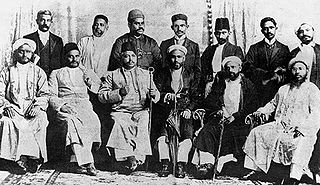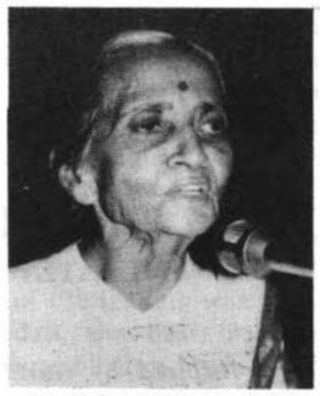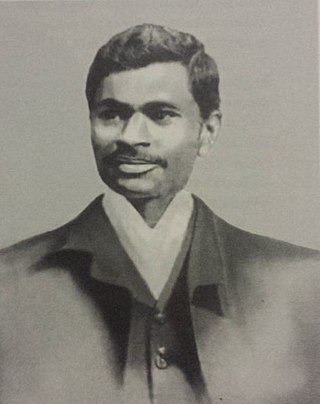
Mohandas Karamchand Gandhi was an Indian lawyer, anti-colonial nationalist and political ethicist who employed nonviolent resistance to lead the successful campaign for India's independence from British rule. He inspired movements for civil rights and freedom across the world. The honorific Mahātmā, first applied to him in South Africa in 1914, is now used throughout the world.

The Indian National Congress (INC), colloquially the Congress Party or simply the Congress, is a political party in India with widespread roots. Founded in 1885, it was the first modern nationalist movement to emerge in the British Empire in Asia and Africa. From the late 19th century, and especially after 1920, under the leadership of Mahatma Gandhi, the Congress became the principal leader of the Indian independence movement. The Congress led India to independence from the United Kingdom, and significantly influenced other anti-colonial nationalist movements in the British Empire.

The Natal Indian Congress (NIC) was a political organisation established in 1894 to fight discrimination against Indians in the Natal Colony, and later the Natal Province, of South Africa. Founded by Mahatma Gandhi, it later served an important role in opposing apartheid. It was the oldest affiliate of the South African Indian Congress.

Usha Mehta was a Gandhian and freedom fighter of India. She is also remembered for organizing the Congress Radio, also called the Secret Congress Radio, an underground radio station, which functioned for few months during the Quit India Movement of 1942. In 1998, the Government of India conferred on her Padma Vibhushan, the second highest civilian award of the Republic of India.
Congress Radio, also known as Azad Radio, was an underground radio station that operated for about three months during the Quit India Movement of 1942, a movement launched by Mahatma Gandhi against the British Raj for independence of India. Congress Radio was the broadcasting mouthpiece of the Indian National Congress and functioned from different locations in Bombay, present-day Mumbai, and briefly from Nashik. It was organized by Usha Mehta (1920–2000), then a 22-year student activist, with the help of amateur radio operators. Others who were involved included Vithalbhai Jhaveri, Vitthaldas Khakar, Chandrakant Jhaveri, and Babubhai Thakkar. The broadcasting equipment was supplied by Nanik Motwane of Chicago Radio, Bombay. Prominent leaders of the Indian independence movement like Ram Manohar Lohia, Achyutrao Patwardhan, and Purushottam Trikamdas were also associated with Congress Radio.
The Congress of the People was a gathering organised by the National Action Council, a multi-racial organisation which later became known as the Congress Alliance, and held in Kliptown on 26 June 1955 to lay out the vision of the South African people. The Freedom Charter was drawn up at the gathering, which was statement of core principles of the Alliance and a symbol of internal resistance against apartheid.
Jhaveri is an Indian surname, common among Sindhis and Gujarati banias. The word "Jhaveri" means jeweler, and is derived from the Arabic Javahari. Though not all people with surname Jhaveri are jewellers by profession, the surname indicates that their ancestors must have been jewelers.

The Indian Opinion was a newspaper established by Indian independence leader Mahatma Gandhi. The publication was an important tool for the political movement led by Gandhi and the Natal Indian Congress to fight racial discrimination and again civil rights for the Indian community and the native Africans in South Africa. Starting in 1903, it continued its publication until 1961.
The South African Indian Congress (SAIC) was an umbrella body founded in 1921 to coordinate between political organisations representing Indians in the various provinces of South Africa. Its members were the Natal Indian Congress (NIC), the Transvaal Indian Congress (TIC), and, initially, the Cape British Indian Council. It advocated non-violent resistance to discriminatory laws and in its formative years was strongly influenced by the NIC's founder, Mahatma Gandhi.

Citibank India is a foreign bank in India with a full service onshore platform. Its Indian headquarters is at Bandra Kurla Complex, Mumbai, Maharashtra. It is a subsidiary of Citigroup, a multinational financial services corporation headquartered in New York City, United States. Citibank India's services are investment banking, advisory and transaction services, capital markets, risk management, retail banking, and Cards. Although headquartered in Mumbai, the bank has most of its workforce based out of Chennai followed by Mumbai and Gurugram.
Darshana Jhaveri, the youngest of the four Jhaveri sisters, is a leading Indian exponent of Manipuri dance, an Indian classical dance form. She is a disciple of Guru Bipin Singh, and started performing on stage in 1958 along with her sisters. She is one of the founders of the Manipuri Nartanalaya in 1972, which popularized Manipuri dance in India, and is currently headed by her, with centres at Mumbai, Kolkata and Imphal.
The South Africa national cricket team toured the West Indies from March to May 2005 to play four Test matches and five One Day Internationals (ODIs).
The Congress Alliance was an anti-apartheid political coalition formed in South Africa in the 1950s. Led by the African National Congress, the CA was multi-racial in makeup and committed to the principle of majority rule.
Pramit Jhaveri is an Indian banker and ex-CEO of Citi. He served as Citi’s India CEO from 2010 to 2019 and is the longest-serving India chief of the bank. Prior to his role as CEO, Pramit set up Citi’s investment banking business in India.

Ismail Ahmed Cachalia (1908-2003), popularly known as Moulvi, was a South African political activist and a leader of Transvaal Indian Congress and the African National Congress. He was one of the leaders of the Indian Passive Resistance Campaign of 1946 and the Defiance Campaign in 1952. The Government of India awarded the fourth highest Indian civilian honour of Padma Shri in 1977.
Vithalbhai Jhaveri (1916–1985) was an Indian independence activist, filmmaker, photographer, writer and a close associate of Mahatma Gandhi. He documented Gandhi, since the Dandi March till his death in 1948, through numerous photographs which were displayed at many exhibitions and used in several literary works. Gandhi-A Photo Biography, a book by Peter Rühe, uses several of his photographs and he was a collaborator of Dinanath Gopal Tendulkar, in the latter's biography of Mahatma Gandhi, Mahatma; Life of Mohandas Karamchand Gandhi. His 330-minute documentary on Gandhi, Mahatma: Life of Gandhi, 1869–1948, covers the Indian leader's life through 14 chapters. The Government of India awarded him the third highest civilian honour of the Padma Bhushan, in 1969, for his contributions to Literature and education.

Pooja Jhaveri is an Indian actress who appears in Telugu, Tamil and Gujarati films. She made her debut with the Telugu film Bham Bolenath in 2015.
Mansukhlal Maganlal Jhaveri (1907–1981) was a Gujarati language poet, critic, and literary historian of the Gandhian era. He was deeply interested in classical Sanskrit poetry and authored History of Gujarati Literature (1978). Jhaveri had several pen-names including Devaki Ayodhya, Punarvasu, Madilant, Samintiyajak, and Siddhartha.

Diwan Bahadur Krishnalal Mohanlal Jhaveri was an Indian writer, scholar, literary historian, translator, and judge from what is now Gujarat, India. His works have been published in Gujarati, English, and Persian. Jhaveri served as president of the Gujarati Sahitya Parishad from 1931 to 1933.

Pranjivandas Jagjivandas Mehta was a Mumbai-born physician, lawyer and jeweller who settled in Burma. He was a close friend of Mahatma Gandhi, helping Gandhi in England, helping him return from South Africa to India and sponsoring him. He also helped Gandhi articulate and elucidate his vision of India in the Hind Swaraj which was written primarily for Mehta. In 1909 he wrote a letter to Gokhale recognising Gandhi as a Mahatma, well before Gandhi was given that title.









